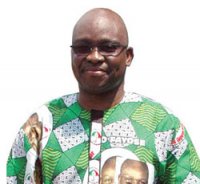Politics
Breaking: Supreme Court Validates Fayose’s Mandate, Upholds His Election As Governor

By Chris Nomjov
The Supreme Court, unanimously upheld the election of Mr. Ayodele Fayose as the Ekiti State Governor, on Tuesday morning. The verdict puts to rest the lingering legal battle to unseat the Governor, by the All Progressive Congress (APC).
?In the unanimous decision by the seven-man panel led by Justice John Fabiyi, the Supreme Court upheld the earlier decisions of the Court of Appeal and the Ekiti State Governorship Election Tribunal, which had both ruled earlier that the petition challenging Fayose’s victory lacked merit.
Justice Sylvester Ngwuta, who delivered the lead judgment, stated that the apex court dismissed all the grounds of appeal filed by the petitioner – the All Progressives Congress – and resolved all four issues arising from the appeal against Fayose’s victory.
Also, the apex court held that the Tribunal was right to have struck out the names of the IGP and COA as parties in the suit.
He noted that a party to a suit is one which his interest is in dispute or which a suit cannot be decided without him.
The court however noted that both the IGP and COA have no interest in the election in Ekiti state and going by the provision of Electoral Act as to who constitute a party to an election petition, the IGP and COA did not fall into such category as they are not staff of INEC.
“Appellant did not show that the IGP and COA have special interest in the election in Ekiti state. It did not even show that they are indegenes of Ekiti state. None of them falls under the category of who can bring a petition to the tribunal as provided by the Electoral Act. Any group outside the officers not employed in the election does so on their own and they can not answer for their conduct.
“IGP and COA at all material time are not staff of INEC, they are not parties to the election in Ekiti state. Assuming they are parties, the relief sought against them is not as to cancellation of the election, it does not therefore make sense to join them”, the court held.
On the issue of impeachment, the court held that the ground raised by the appellant is not part of the provision of the Electoral Act as to disqualify a governorship aspirant.
?The court further cited S182 (1)(e) of the 1999 Constitution which provides qualification for a governorship aspirant.
“A conviction and sentence are the major issues here. The code of conduct is not an impeachment panel. Jurisdiction cannot be shared between code of conduct tribunal and impeachment panel. Even though, it was alleged that the governor was impeached for embezzlement, he was not arraigned before a court of competent jurisdiction”, the court held.
The court also noted that the first impeachment panel gave Fayose a clean bill.
He also noted that the second panel constituted was unconstitutional because the judge that constituted it did not have the power to do so.
The court also held that the Ekiti state house of assembly did not substantiate the petion and hence one cannot say that he committed any crime.
Citing S188 of the Constitution, the court held that the second panel was an unconstitutional panel and that it’s proceeding was an exercise in futility.?
The court however resolved the issue against the appellant.
On the issue of forgery, the court held that it is an offence that should be proved beyond reasonable doubt.
“To prove forgery, the original document must be produced and also the forged document. In this case , only one document was produced. ?Appellant was not even certain that the other name it alleged existed. A person impersonated must have been brought into the case.
“The appellant here has failed to prove the case of forgery beyond reasonable doubt and more so the principle of Estopel has caught up with the issue as the matter had once been decided once and hence cannot be litigated over again.
The court also resolved the issue against the appellant.
“In the final analysis, the appeal is hereby dismissed for lacking in merit. The judgement of the court below is hereby upheld”, the court held.
The Independent National Electoral Commission, INEC, had declared that Fayose of the Peoples Democratic Party, PDP, polled 203,090 votes to defeat the then incumbent governor, Dr. Kayode Fayemi, of the All Progressives Congress, APC, who attracted 120,433 votes? in the June 2014 election.
Dissatisfied with the results declared by the INEC, the APC had filed a petition, even after the party’s flagbearer and incumbent Governor at the time, Kayode Fayemi, had conceded and congratulated Fayose on his victory. The APC prayed the Ekiti State Governorship Election Petition Tribunal which sat in Abuja to nullify the election.
But following the rulings of the Tribunal and the Court of Appeal, the party proceeded to the apex court seeking a determination whether Fayose was still qualified to stand for election despite his indictment by a panel and whether by virtue of the alleged partiality of the military in the 2014 election, the outcome should still be valid.






